Rafah, Gaza Strip 22 December 2006
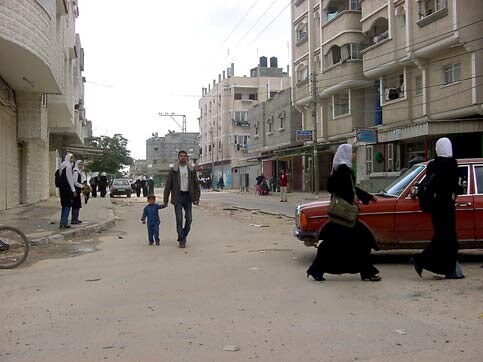
Entering Rafah. (Dr. Bill Dienst)
19 November 2006 in Southern Gaza
Yesterday, here in Gaza, I met Scott Kennedy, a former mayor of Santa Cruz, California. He has been traveling in the Middle East and touring the West Bank and Israel.
Today Mr. Kennedy is being escorted to visit Rafah, from El Deira Hotel here in Gaza City, by a Palestinian Authority convoy, and I have decided to go along with him. We will also drive through Khan Younis, and through ruins of the former Israeli coastal settlements of Gush Katif, which used take up over a third of the beachfront in the Gaza Strip. We won’t have time to get out of the convoy at these places, however.
Here we are all together in a car, with fully armed Palestinian guards in SUV’s immediately in front of and behind us: two Americans and Mr. Husam El Nou-Nou, a Palestinian colleague of ours from Gaza Community Mental Health Programme. We are being taken to Rafah under full police protection traveling at high speeds, with sirens blaring and emergency lights flashing. The PA is protecting us from US.
All this VIP security has been deemed necessary because of excessive cruel policies of our American government under the Bush Administration…policies which have waged war, obstruction, obfuscation and non-diplomacy. This has humiliated the PA and now blockaded Hamas. Bush has been extremely destructive toward the welfare of the Palestinian people as a whole.
We must be protected just in case there might be someone in this crowded congested destroyed living hell here in Rafah who might take issue with our US government’s unconditional support for Israel, despite its many recent and remote atrocities against Palestinian people here. All it takes is one angry armed person who has been in this pressure-cooker too long. Someone whose life has been ruined by Israel and our government’s indifference, and who may want to seek revenge against Scott Kennedy or me as a symbol of this oppression, just because we are US citizens.
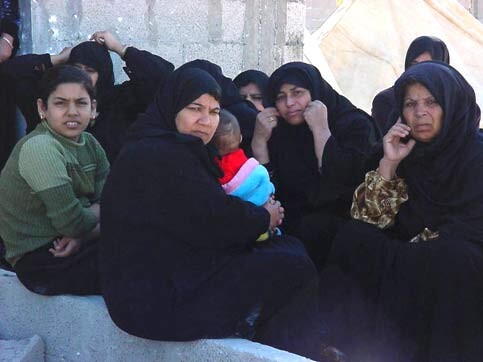
Rafah women grieving 8 hours after Israeli tanks and bulldozers destroyed their home which previous sheltered 40 family members, November, 2003. (Dr. Bill Dienst)
Because of the US government’s cruelty toward the Palestinian people, the Palestinian Authority must take exceptional measures to protect us while we visit Rafah. How ironic! And what exceptional hospitality! I just wish all this money could be spent to help all the impoverished people we see outside the car windows all around us as we whiz by through Khan Younis and on to Rafah…
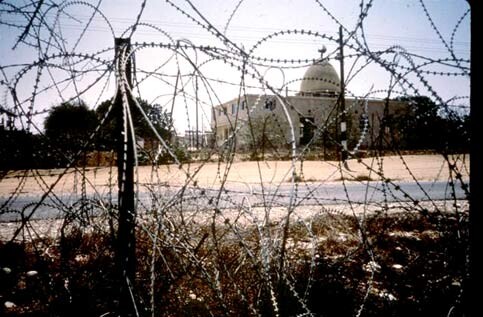
The border region of Rafah in 1985. (Dr. Bill Dienst)
I have been to Rafah twice before. The first time was in 1985 when an iron gate and two iron picket fences separated urban Rafah from the Egyptian side of the city. Back then, relatives on each side could still see each other, and used to shout to each other through their respective sides of the gate and fence. This forced separation was sad in 1985, but looking back, those were much better times compared to now.
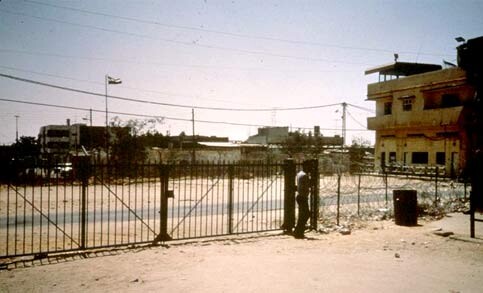
The border region of Rafah in 1985. (Dr. Bill Dienst)
I was also in Rafah a second time in November of 2003, two weeks after former Israeli PM Ariel Sharon ordered the destruction of apartments along the huge iron wall that replaced the iron fence and border with Egypt. The Old Salah Al Din road and Salam neighborhoods were decimated to widen this wall, which in Orwellian Doublespeak is now called the “Philadelphia Corridor.” At that time, more than 2000 people were made homeless overnight, and many more people’s apartments were still livable, but still partially destroyed and very scary. Many of these were then completely destroyed later on. Is this what you call brotherly love?
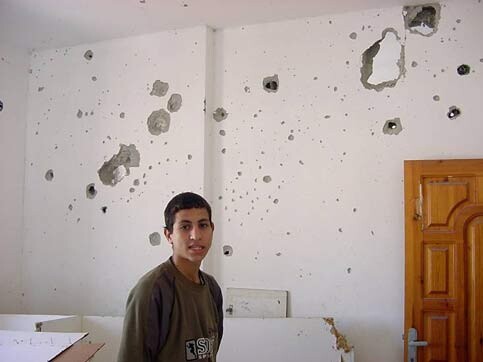
Destruction of the border region of Rafah in November, 2003. (Dr. Bill Dienst)
As horrifying as that was, Rafah’s persecution was only in its early stages. Since then, over 2500 homes have been destroyed here in Rafah and 4000 families, approximately 20,000 individuals, have been made homeless by Israel’s so-called “security measures.”

Destruction of the border region of Rafah in November, 2003. (Dr. Bill Dienst)
All this destruction occurs in one of the most densely populated areas on earth; this congestion is a pre-existing reality due to “The Catastrophe,” i.e., the carving of Israel out of Palestine in 1948. This created eight refugee camps in Gaza, thus making this flat, arid sandy landscape an extremely overcrowded place.
Israel pulled its 8,000 settlers from Gaza a year ago in 2005. Their departure freed up 40% of the land in Gaza for 1.5 million local Palestinians. Gush Katif, the huge settlement block in the south comprised a third of the beach front land in Gaza and once looked like the French Riviera prior to its near total demolition before the pullout. It has a lot of commercial and residential potential. Unfortunately, this land still lies dormant because there is no money for development.
The Palestinian economy in Gaza is largely dependent on institutions, which are dependent on international aid, because Gaza is small, overcrowded and markedly limited in natural resources. Local Palestinians are now suffering under a policy of economic strangulation.
They are being collectively punished for openly practicing democracy. Whether one agrees with the ideology of Hamas or not, the fact remains that the people elected Hamas to a majority in the legislative council in fair elections, and their decisions should be respected. Unfortunately they are not.
And now because Hamas has been declared a “terrorist” organization by Israel, there is no diplomacy at all. Farms, factories, workshops and fishing boats have been systematically destroyed by the IOF or have deteriorated, depriving locals of their ability to earn a living. Government employees have not been paid in months, Israel is holding on to tax revenues that are due to the Palestinian Authority, and even Non-Governmental Organizations have experienced delays in funding. The people here have been totally bullied by Israel and its financiers in the West. What can they do?
Our first stop in Rafah is Al Awda Clinic, which is sponsored by the Union of Health Work Committees, an NGO. This clinic provides comprehensive primary care services, including house-calls. House-calls are done both on those confined to their residences due to medical conditions and also for those who are vulnerable to arrest or targeted assassination by the Israeli Occupation Forces and are hiding out.
Upstairs is the Rachel Corrie Center, which receives financial support from the Olympia-Rafah Sister City Project and through other sources. Its director, Mr. Sa’id Sekweil takes us on a tour.
It is estimated that 27.5% of the children in Rafah are now suffering from learning disabilities, and there is a high rate of speech delay as well. There are high rates of bedwetting, malnutrition, sleep disturbances and aggressive violent behavior.
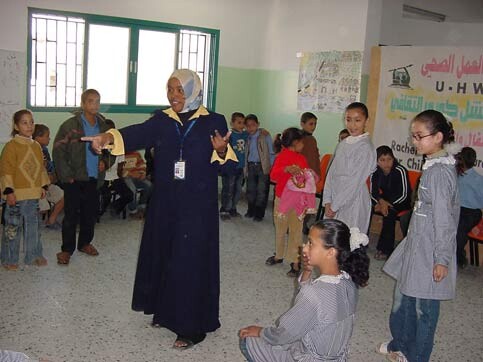
At the primary school at Rachel Corrie Center. (Dr. Bill Dienst)
Rachel Corrie Center has services for children with special needs. We are brought into a room where a local speech therapist is working with 2 young boys who are suffering from severe cognitive and language delay due to Chronic Stress Disorder. Their facial expressions are very flat compared to normal children the same age. Repetitive exposures to loud explosions are also producing many children who have hearing deficits.
In another room there is a school where English language courses are taught in order to “connect local Rafah children to the world.” There is also a computer lab to allow internet access and teach children computer skills.
Last spring the school held a mother’s day celebration. The students performed mock trials which held George Bush, Condi Rice and Israeli leaders accountable for war crimes.
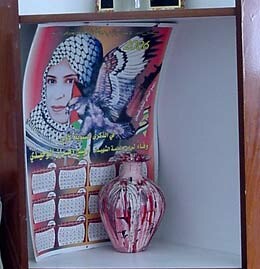
At the Women’s Empowerment Program at the Rachel Corrie Center. (Dr. Bill Dienst)
Rafah is a traditional Islamic culture currently undergoing immense stress. The men, who have been the traditional breadwinners in this society, now experience 70% unemployment and are under intense humiliation. Domestic violence flourishes in such a situation. Women here are experiencing domestic violence in more fractured settings than ever before, whether they are married, divorced, separated or widowed.
Since 2005, as part of a strategic plan, a Victims of Violence program has been developed. It is now a 1 year program with 2 overlapping courses. Currently 48 women per year are enrolled. The program has a psychological component, an economic component and a social component.
There are group classes and well as individualized therapy tailored to each woman’s needs, her educational background, and other factors. There is the formal program, which lasts 6 months, and then a follow up over several months to troubleshoot ongoing problems.
Women’s Empowerment Project also has school based programs in six area schools where violence issues, women’s rights, and where more sensitive topics like sex education, which has previously been taboo, are discussed.
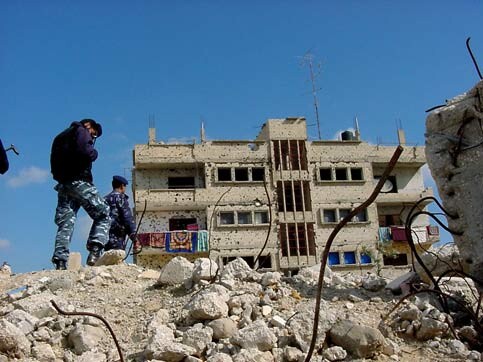
Destruction of “O” block on the Rafah border with Egypt. (Dr. Bill Dienst)
There is also advocacy work where WEP interacts with traditional tribal systems of justice. In the current adverse environment, honor killings have become more frequent than before.
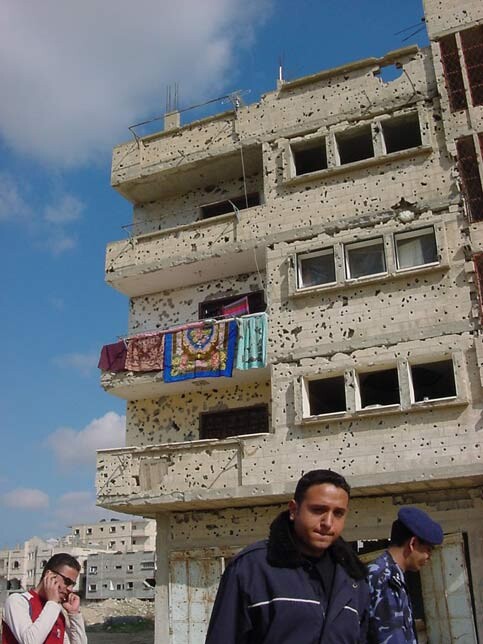
Destruction of “O” block on the Rafah border with Egypt. (Dr. Bill Dienst)
Next we journey to the “O” block neighborhood which was build by UNRWA and has since had 700 homes destroyed. We also visit the Salam neighborhood which was built 20 years ago by local authorities and since 2003 has been totally destroyed. It is here where Rachel Corrie was killed.
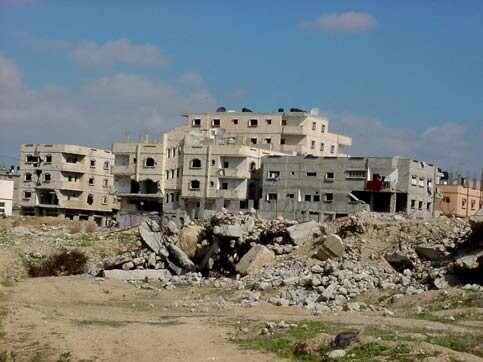
Destruction of “O” block on the Rafah border with Egypt. (Dr. Bill Dienst)
On our way north, we drive through Khan Younis, and then toward the beach where the Israeli settlement blocks of Gush Katif had been. This area was completely leveled just prior to the removal of the settlers; only a few greenhouses remain. Today this area too is still a vast wasteland waiting for the embargo against the Palestinian Authority to end so that it can be put to better use.
Dr. Bill Dienst is a rural family and emergency room physician from Omak, Washington, USA.





